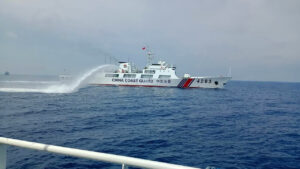That Chinese aggression towards Philippine vessels right within our own Exclusive Economic Zone is taking place with alarming frequency does not make it any less reprehensible, legal, or morally right.
Just a few days ago, on June 20, Chinese Coast Guard (CCG) vessels once again harassed Philippine Bureau of Fisheries and Aquatic Resources (BFAR) vessels near Bajo de Masinloc. CCG ship 4106 shadowed and issued radio threats to the BRP Datu Daya and BRP Datu Bangkaya, falsely claiming the area as Chinese territory.
On the same day, other Philippine vessels — BRP Datu Taradapit and BRP Datu Tamblot — were also attacked with water cannons. The United States, South Korea, and New Zealand have publicly denounced these water cannon attacks.
These incidents are only the latest in the established dangerous pattern where China harasses Filipino fisherfolk, destroys our marine ecosystems, and blatantly ignores international law including the 2016 decision by the Permanent Court of Arbitration. It is imperative that as Filipinos, we protest these actions every step of the way, assert our sovereignty, and emphasize the supremacy of international law.
Unfortunately, we have leaders in our midst who, instead of championing Philippine interests, conduct themselves in a manner that betrays our trust.
Unfortunately, we have leaders in our midst who, rather than defending Philippine sovereignty with clarity and conviction, choose instead to cast doubt on our strategic direction. Instead of confronting the real dangers posed by Chinese aggression, they question the wisdom of our alliances and paint our foreign policy as overly reliant on partners who have consistently stood by us.
These remarks, while couched in calls for independence and neutrality, echo narratives long pushed by Beijing to weaken our resolve in the West Philippine Sea. By blurring the lines between neutrality and indifference, such statements risk undermining public understanding of the stakes and suggest a false equivalence between aggressor and ally.
When public officials hesitate to clearly stand on the side of our national interest, it raises serious concerns. Filipinos expect their leaders to be resolute in the face of external threats — not to muddy the waters or diminish the gravity of what is happening in our own waters.
Filipinos are well aware of the issue of China’s bullying at sea. Surveys have consistently shown that the people overwhelmingly support a firm position on the West Philippine Sea. In a February 2025 poll, eight of 10 respondents said the government should strengthen alliances through joint patrols, joint sails, and military exercises to defend our maritime rights.
In a May 2025 survey, the majority of Filipinos — 72% — expressed a preference for candidates who take a strong position against China. This distrust of pro-China political figures shows that the public is aware, informed, and unwilling to tolerate weak leadership. Leaders who pander to Beijing are losing public support — and rightfully so.
Externally, the drive to defend ourselves against incursions into our sovereignty is supported by the international community. This international support is not accidental — it is the result of the Marcos Jr. administration’s consistent diplomatic engagement, strengthened defense cooperation, and assertive transparency strategy to expose China’s aggression. The Philippines is fortunate to have like-minded countries that share our respect for, and commitment to, the established rules-based order. We are, thankfully, in good company.
The protection of our territory is spelled out in our Constitution. It is the embodiment of patriotism — loving what is ours and ensuring that no other entity lays claim to it, harms and threatens our people. China’s undeniable acts of aggression call for a response that is assertive and firm as much as it is diplomatic. We are a peace-loving nation, sure. But peace must not be mistaken for complacency and capitulation, even to a bigger power with a stronger military. This very principle is what is protected by international law.
We chose the officials who lead us because we believed them when they promised to champion our interests — above their own, above others’. This is exactly why we are rejecting those who are parroting the lines of a foreign aggressor, twisting the facts, and downplaying the implications of the aggression on the life of our nation.
The attitude of our officials must at least match the dedication of our military and the civilians bravely taking part in missions to assert our sovereign rights in the West Philippine Sea. The lack of courage to stand up to China’s bully tactics reveals their fundamental flaws as a leader and public servant. What we need now is moral clarity and political courage.
The stakes are not abstract — they affect the livelihoods of our fisherfolk, the safety of our waters, and the dignity of our nation.
Leaders who remain vague, evasive, or sympathetic to aggression must be reminded: silence and equivocation, in the face of threats to sovereignty, is complicity. The Filipino people deserve — and demand — leaders who do not flinch in the defense of what is rightfully ours.
Victor Andres “Dindo” C. Manhit is the president of the Stratbase ADR Institute.

